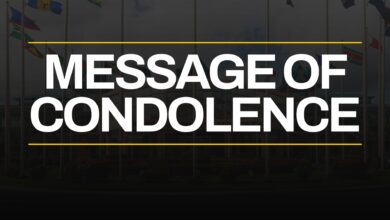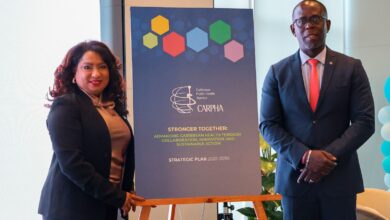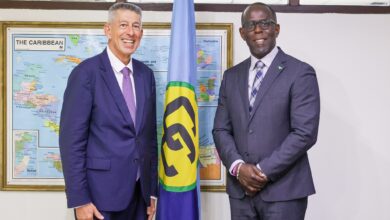(CARICOM Secretariat, Turkeyen, Greater Georgetown, Guyana) Australia will make some $60 million (AUS) available over four years to the Caribbean Community (CARICOM) for cooperation in a number of areas of special mutual interest.
These areas are: climate change, disaster risk reduction and emergency management; regional integration including trade facilitation; education, including in the fields of science and technology, provision of scholarships and training of diplomats; university co-operation; food security and agricultural co-operation; renewable energy, microfinance; border security and sport, youth and culture. The CARICOM Development Fund (CDF) may also benefit from these resources.
This follows the signing of a Memorandum of Understanding (MOU) between the two parties by Secretary-General of CARICOM, His Excellency Edwin Carrington and the Prime Minister of Australia the Honourable Kevin Rudd on Sunday 29 November, in Port of Spain, Trinidad and Tobago in the margins of the Commonwealth Heads of Government Meeting.
The meeting with the Prime Minister of Australia was one of four bilateral meetings between CARICOM Leaders and other Commonwealth Heads of Government, all of whom are members of the G20. It was the first formal engagement between the two sides at the level of Heads of Government. The Foreign Ministers of both sides had met, also in Port of Spain, on Wednesday in preparation for the Summit.
CARICOM leaders also met with the Prime Ministers of Canada and the United Kingdom as well as the President of South Africa in pursuit of several objectives. These included refreshing relations with long-standing partners such as Canada and the United Kingdom; renewing ties with South Africa under its new President; establishing new cooperation partnerships in the case of Australia; articulating the priority concerns of the Community to external partners that, as members of the G20, wield influence on the global economic stage; and exchanging views, where necessary, on bilateral issues of concern to the Community.
As climate change had been the primary focus of the discussions at the CHOGM, the Community had had the opportunity in that meeting to fully ventilate its views and recommendations in this area. Emphasis was therefore placed during the bilateral meetings on the devastating impact on the Community of the global economic crisis which had highlighted once again the special circumstances of small, highly indebted middle-income states whose peculiarities stemmed from their vulnerability as well as their smallness. The inequity of grouping such states with the larger developing middle-income countries was underlined, as was the need to craft for them a new development model.
Such a model would need to include support for adaptation to the effects of climate change; the establishment of special funding instruments to respond to the region’s vulnerabilities – natural disasters; measures to deal with the limitations of economic diversification; easier access to funds set aside within International Financial Institutions by the developed nations to respond to the impact of the global crisis on developing countries; increased Overseas Development Assistance flows; and trade policies which recognize the peculiarities of the Community’s circumstances and the need for special and differential treatment.
All parties agreed that not only was IFI reform necessary to make them better reflect the realities of today’s world, but, it was advocated, that the opportunity should be afforded for the voice of small states like CARICOM’s to be heard in global economic fora with restricted membership such as the G 20. Although all four countries with which bilateral discussions were held were willing to represent the concerns of the region in the G20, the Community indicated it would be necessary for it to be consulted on its views prior to such representation.
On the bilateral front, negotiations with Canada for a free trade agreement having commenced recently, that country’s Prime Minister the Honourable Stephen Harper was of the view that the proposed CARICOM-Canada Summit could take place when the trade talks are nearer to completion, probably in late 2010. Issues related to the impact of the global economic crisis, the G20 and the peculiarities of small middle-income countries were touched on. The Community thanked Canada for its development assistance programme to the region and, especially to Haiti.
CARICOM leaders raised with the Prime Minister of the United Kingdom the Honourable Gordon Brown their concerns over the inequity of the recently imposed Airline Passenger Duty (APD), which places the region’s tourism sector at a competitive disadvantage. It was agreed that the Community would send a team to the UK to further discuss a proposal it had put forward with respect to placing the region in a more favourable band of the APD.
Concerns were also expressed over the direction of UK’s new immigration policy which inter alia imposes new visa requirements on some CARICOM Member States. It was agreed that both sides should find a new and more nimble informal mechanism to address concerns in the relationship.
CARICOM Heads of Government and South Africa President His Excellency Jacob Zuma agreed that efforts needed to be made to move beyond words and to take action, including the establishment of linkages between the relevant institutions, with a view to strengthening relations with South Africa itself, but also with the African Union (AU) and the Southern African Development Community (SADC). President Zuma indicated that he would make himself the advocate on this matter with both Organizations.
Trade, tourism, climate change, security, air links, establishment and strengthening of ties between universities were viewed as areas in which the two sides could cooperate. South Africa indicated its interest in initiating negotiations in 2010 for an air services agreement with CARICOM. Other areas touched on related to the G20, the Diaspora Summit, and Zimbabwe. On several occasions, President Zuma referred to the valuable contribution made by CARICOM, and its music, to South Africa’s fight for freedom.





